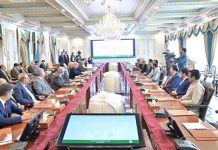LAHORE, /DNA/ – The All Pakistan Business Forum (APBF) on Saturday expressed its concerns over the alarming rise in the trade deficit of the country, which has gone all-time high in Nov, showing a steep rise of 162%, driven mainly by more than three-time increase in imports compared to the exports from the country.
APBF President Syed Maaz Mahmood said that only recovery in exports would ease pressure on the external sector, as the reversing trend in trade deficit was witnessed for the fifth consecutive month because merchandise trade deficit reached $5.107 billion in Nov against $1.94 billion over the corresponding month last year. This is the highest trade deficit recorded in a single month in terms of value. He said that widening gap in exports and imports is affecting the current account balance. The current year started with a rising import bill which poses a serious threat putting pressure on the external side. The import bill in Nov reached an all-time high of $8 billion from $4.12 billion over the corresponding month last year, indicating an increase of 94%.
APBF Chairman Ibrahim Qureshi said that Pakistan faces this unprecedented trade deficit despite the prevalence of low international prices of our biggest import oil. A number of reasons can be attributed to the increasing trade deficit, which includes structural factors and erroneous policies. Unlike the Middle East or East Asia, Pakistan has followed a traditional policy of import substitution rather than export promotion. Therefore, little emphasis has been given on broadening exports that have remained over-reliant on textiles. Exports of cloth, cotton yarn and value-added textiles make up to almost 60 per cent of our total exports. The economic charts of Pakistan stand on an unsatisfactory level at the moment. We ask the government and policymakers to encourage private sectors to play their roles in putting the economy back on the right track, he added. We should fully avail the opportunities created due to the worldly chain of events, such as the global decline in oil prices and the China-Pakistan Economic Corridor (CPEC).
APBF President observed that the government’s battle against the bloated trade deficit is reversing and may cause pressure on the external side because of all-time high imports, however, it also helped the Federal Board of Revenue collect maximum revenue at import stage — sales tax, withholding tax and customs duty..
The first five months of the current fiscal year saw a rise of more than 117.25% in trade deficit. The merchandise trade deficit rose to $20.74 billion in July-Nov 2021 from $9.55 billion over the corresponding months last year.
Syed Maaz Mahmood believed that an increase in remittances, growth in export proceeds and Roshan Digital Accounts would help mitigate the pressure to a large extent.
One of the major initiatives of the government to encourage imports of raw materials also pushed up the import bill. Oil prices have also increased substantially, which pushed up the import bill because of high demand for energy in the domestic market.
A surge was noted in imports of vehicles, machinery as well as vaccines, pushing the import bill. In FY21, the import bill surged by 25.8% to $56.091bn from $44.574bn the previous year.
APBF President said that the policy intervention of government and State Bank of Pakistan in terms of controlling rupee devaluation and tariff and non-tariff barriers could yield some positive results as exports are picking up. He warned that exports recovery can only ease pressure on the trade balance. The government should contain the deficit within manageable limits.












